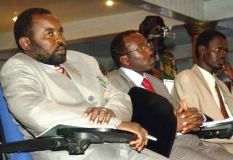Darfur peace talks tackle thorniest issues
Dec 2, 2005 (ABUJA) — Delegations gathered in Nigeria for the seventh round of Darfur peace talks come to the table with a sense of optimism absent from the first six rounds.
 Splintered rebel groups have agreed to set aside the differences that derailed earlier discussions and present a unified front.
Splintered rebel groups have agreed to set aside the differences that derailed earlier discussions and present a unified front.
The former southern rebel group that negotiated its own peace with Khartoum to end a separate 20-year war, and who Darfur rebels see as sympathetic to their cause, have joined the talks.
And the venue has changed.
Gone are the luxurious five-star hotels of the previous rounds, which some said encouraged lengthy talks to maximise the hospitality of the Nigerian capital Abuja.
Instead, a small hotel on the outskirts of town with limited Internet and telephone links has been chosen to house the gathering.
“It seems this is a deliberate choice to make people focus on the talks,” said one African Union official. “There are no distractions here,” he said.
But despite the elements that augur well for an end-of-year deal the United Nations and United States have called for, the issues at the heart of the Darfur conflict have yet to be tackled.
Still outstanding are agreements on sharing Sudan’s growing oil wealth, political autonomy for Darfur, and security in the vast desert region the size of France.
“There are very difficult issues which are going to tackled in this round — like power sharing, issues of percentages of power — those are very intractable issues,” said Sam Ibok, head of the AU mediation team.
The United Nation’s top envoy in Sudan Jan Pronk said: “A framework agreement … is possible but difficult because the positions of the parties in the talks are still far apart.”
SECURITY, POWER, WEALTH
More than 2 million people have been driven from their homes to squalid refugee camps in Darfur, and tens of thousands have been killed in fighting since the rebels took up arms in February 2003 saying the government in Khartoum marginalised and ignored the region.
The government dispatched militias to put down the rebellion but thousands of civilians were caught up in the conflict. The militias are accused of a widespread campaign of rape and looting that the United States called genocide.
Earlier rounds secured agreements to stop the fighting, allow AU ceasefire monitors and ensure humanitarian access. But the results on the ground were mixed.
Large-scale conflict, rape and pillaging subsided in the middle of this year, but the United Nations said last week killing and rape was on the rise again and the region was sliding towards complete lawlessness.
Informal talks on security were among the first items on the agenda at Abuja. The delegations on Friday began discussing power sharing in earnest and talks on wealth sharing begin next week.
The Sudanese government has proposed a system of federal rule and limited autonomy for Darfur. The proposal is similar to that agreed for three contested central Sudanese areas under a separate peace deal signed in January to end a bitter civil war in southern Sudan.
Rebels say they will not accept just autonomy, but also want a share in central government, including a rotating presidency and the right to elect their own governors for the Darfur region, positions which are currently appointed by Khartoum.
The Sudan Liberation Army (SLA) is campaigning for control over a large proportion of the jobs in central government and of the nation’s 330,000 barrels per day oil output.
OIL
“We want power in proportion to the population of Darfur,” SLA leader Abdel Wahed Mohamed el-Nur said. He said Darfur was as marginalised as southern Sudan and deserved a similar settlement.
The south won about 50 percent of Sudan’s oil revenue, which is mostly derived from that region, and a referendum on secession within six years in their peace deal signed in January.
The Darfur rebels want a similar deal but the government has rejected such an agreement for its western region.
The former southern rebel Sudan People’s Liberation Movement’s Yasir Arman would not comment on the particulars.
But he said the group’s three delegates, part of the government delegation at Abuja, “brought 20 years of negotiating experience and good relations with the rebels as well as partnership with the government to the talks”.
“We are rebel graduates and we know the feeling of demanding. … There is a crisis in Darfur and this needs to be addressed in a fair and just manner,” Arman said.
Some are hoping the new-found rebel unity and the influence of the SPLM will produce a final agreement that has eluded past negotiators.
“All the elements are coming together with the rebel’s unified position and the presence of the SPLM and if we can maintain that … it does raise the level of confidence,” the AU’s Ibok said. “We are optimistic, but it is cautious optimism.”
(Reuters)
